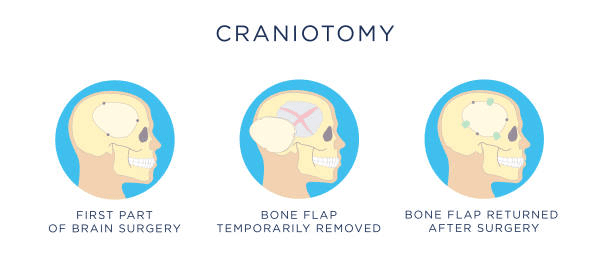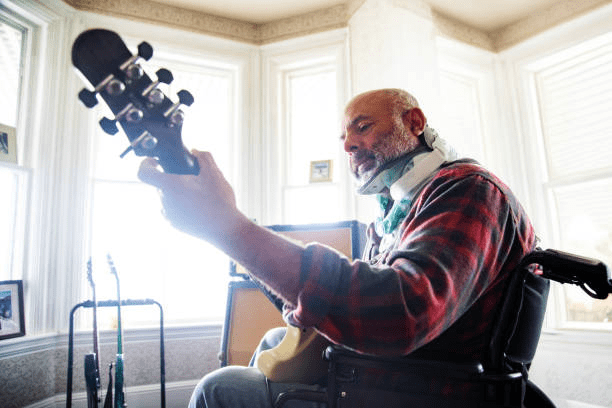The brain is the most complex and least understood human anatomy, highlighting its incredible function and importance. It controls our thoughts, memories, emotions, and actions. Conditions affecting the brain can cause significant physical, cognitive, and emotional challenges, affecting everyday activities and well-being.

“Craniotomy,” says Dr. Gurneet Singh Sawhney, one of the best neurosurgeon in Mumbai, “offers a crucial solution to treat these conditions effectively. It involves removing a portion of the skull to access the brain. This procedure allows for treating various brain issues, providing relief and improving quality of life.”

Are you or a loved one dealing with a brain condition and seeking guidance? Please consult a certified neurosurgeon for tailored advice and guidance.
What to Expect after Craniotomy
Let’s look at the journey that unfolds post-craniotomy:

Immediate Post-Operative Period:
Right after surgery, patients typically spend time in an intensive care unit (ICU) where medical staff closely monitor vital signs and neurological status and manage pain.
Pain Management:
It’s common to experience discomfort or mild pain around the incision site. We manage this with prescribed pain medications to ensure comfort as the initial healing begins.
Observation:
The medical team vigilantly watches for any signs of complications, which are critical in the days following the operation. These include complications like bleeding, swelling of the brain, or infection.
Initial Recovery:
The duration of hospitalization can vary based on the specific reasons for the craniotomy and how the patient responds to the surgery. Usually for an electric craniotomy patient gets discharged in 3 weeks.
Post-Operative Instructions:
Upon discharge, patients receive detailed instructions on how to care for the surgical site. The instructions also list the signs of potential problems to watch for and when to seek medical attention.
Follow-Up Visits:
Follow-up appointments are crucial to monitoring healing and managing any long-term effects of the surgery. These visits also allow for adjusting medications and assessing the need for rehabilitation services.
Cognitive and Physical Therapy:
Depending on the area of the brain that was involved in the surgery, some patients may require therapy to help with cognitive function or physical coordination.
Gradual Return to Activities:
Doctors advise patients to return to their daily activities as soon as possible. The household activities can be resumed immediately after discharge. After stitch removal which is on the 10th day, the patient can take a head wash using mild soap or shampoo. The timeline for resuming complete activities can vary widely based on the individual’s recovery rate and the complexity of the surgery.
How Long Does It Take to Fully Recover from a Craniotomy?
Generally, patients can expect:
Initial Recovery After Discharge:
The initial recovery, during which patients can manage basic activities at home, takes about 1 week. During this period, temporary post-craniotomy side effects like fatigue, headaches, or sensitivity at the incision site are common.
Full Recovery:

Full recovery is when patients can return to all or most of their normal activities, including work, driving, and physical exercise. Achieving full recovery can take 1 month, the patient gets back to work after 2-3 weeks. In some cases, especially where the surgery was extensive or complications arose, full recovery could take longer.
Neurological Function:
For some, ongoing neurological assessments and rehabilitation may address any changes in cognitive, sensory, or motor skills. The patient who have had an emergency craniotomy due to head injury or brain hemorrhage may take longer for recovery. Recovery is highly individualized and may sometimes take over a year.
Patients must maintain regular follow-ups with their medical team to monitor their recovery and effectively manage any lingering or emerging symptoms. Each recovery milestone can vary, and it’s essential to tailor expectations and activities to the individual’s healing progress.
Can You Live a Normal Life after Craniotomy?
YES, Conditions such as brain tumors, epilepsy, aneurysms, and traumatic brain injuries may necessitate the use of a craniotomy. The goal of craniotomy is to restore as much normalcy as possible, empowering patients to thrive after surgery. The ability to return to normal activities largely depends on the underlying reason for the surgery, the specific area of the brain involved, and how the individual heals.

Dr. Gurneet Singh Sawhney, a trusted neurosurgeon in India, adds:
“Most patients can resume their daily routines, including work and social activities. However, this may involve some adjustments based on their recovery. Rehabilitation plays a crucial role in getting back to your everyday life after craniotomy. For those who experience changes in motor skills, speech, or cognition, targeted therapy helps regain lost functions or adapt to changes.”
With proper care, support, and rehabilitation, the goal is always to help patients achieve the best possible quality of life after craniotomy.
Long-Term Craniotomy Side Effects
Long-term side effects of craniotomy may include:
- Cognitive impairments such as difficulties with memory, focus, or problem-solving
- Challenges with coordination or fine motor skills
- Difficulties with speech or language comprehension
- Shifts in mood or behavior, including irritability
- Possible development of seizures requiring medication
- Ongoing pain at the incision site or persistent headaches
- Altered or reduced sensation in parts of the body
- Potential hormonal issues if brain regions regulating hormones are affected
- Risks of depression, anxiety, or PTSD
Monitoring and medical support are crucial for managing these effects post-surgery.
Are you concerned about long-term side effects impacting your daily life? Consulting a neurosurgeon for personalized insights and management strategies is advisable.
Life Expectancy after Craniotomy
Several factors can influence life expectancy after craniotomy. These include the patient’s age, health, underlying conditions, success of the surgery, and adherence to post-op care. Many patients enjoy an average lifespan, primarily if the surgery addresses the brain condition effectively.

Continuous medical follow-up and healthy lifestyle choices contribute positively to long-term outcomes. Understanding these factors helps set realistic expectations and plan for a healthy future.
Conclusion
The brain’s complexity and importance cannot be overstated, and brain conditions pose significant challenges. However, advancements in medical science and dedicated professionals are making remarkable differences in patients’ lives. With the proper treatment and support, individuals can overcome these challenges and look forward to a promising future.
Would you like to understand more about life after a craniotomy? Please consult a neurosurgical specialist to discuss your situation and explore your options.
Take the first step towards recovery and improved quality of life.
FAQs
What is the aftercare of a craniotomy?
After a craniotomy, patients need to follow a structured aftercare plan. This includes regular follow-up visits, medication management, wound care, and physical therapy to ensure optimal recovery.
Does hair grow back after craniotomy?
Yes, hair usually grows back after a craniotomy. The surgical area may take some time to heal, but hair regrowth resumes naturally in most cases.
Can a craniotomy cause memory loss?
A craniotomy can sometimes cause memory loss, depending on the location and extent of the surgery. However, many patients experience gradual improvement with rehabilitation and time.
How many times can a person have a craniotomy?
A person can undergo multiple craniotomies if necessary. The decision depends on the individual’s medical condition and the neurosurgeon’s assessment of the risks and benefits.
